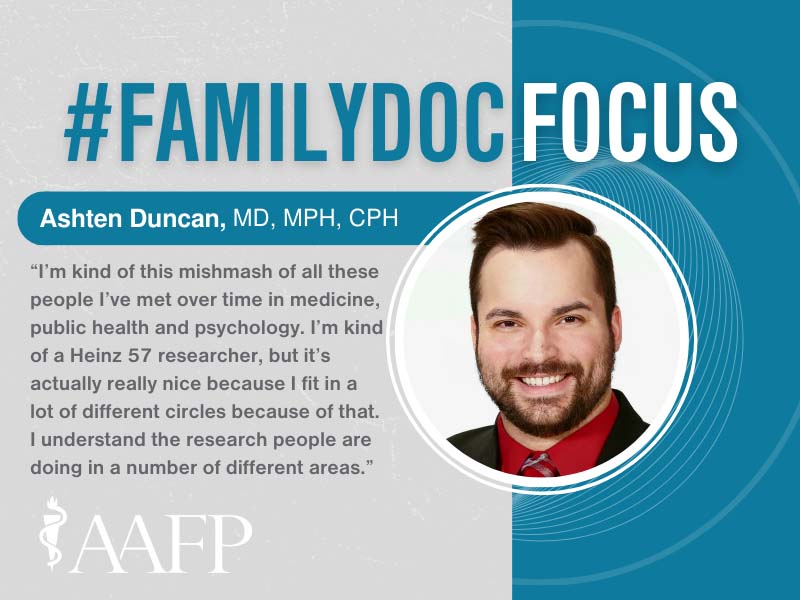GME Award Winner Found His Niche in Research
Nov. 8, 2023, David Mitchell — Ashten Duncan, M.D., M.P.H., C.P.H., still has more than seven months remaining in his training at the University of New Mexico-Santa Fe Family Medicine Residency, but he already has published more than a dozen research papers in peer-reviewed journals.

That’s prolific output considering that his first foray into research didn’t leave him wanting more.
“I thought research was an awful quagmire of abuse and overwork,” said Duncan, who struggled to find a mentor as an undergraduate student at the University of Oklahoma. “A lot of professors were not interested in working with undergrads. They were like, ‘You’re just extra weight,’ and it was very much a publish-or-perish environment. When I finally got into the lab with one of the professors, it was not a good experience. It was not supportive. It was like, ‘You’re here to work for me or you’re out.’ It wasn’t about me developing any skills.”
Things changed for Duncan when he had the chance to work with American Red Cross Divisional Chief Medical Officer Walter Kelley, D.O., a pathologist and a transfusion medicine specialist who was then medical director of the Oklahoma Blood Institute, on a case regarding blood donors and West Nile virus. Ann Chou, Ph.D., M.P.H., research faculty in the Department of Family and Preventive Medicine at the University of Oklahoma’s Oklahoma City campus, introduced Duncan to studies related to clinical genetics and health care delivery.
However, the person Duncan credits with cementing his passion for research is psychologist Chan Hellman, Ph.D., M.A., director and professor at the University of Oklahoma’s Hope Research Center in Tulsa.
“It wasn’t the kind of experience most students have, where it’s like, ‘Well, you’re a novice, but I’m going to include you in this project, give you a piece of it and you’ll get some credit,’” said Duncan, a University of Oklahoma-University of Tulsa School of Community Medicine graduate. “He was very much of the mindset that, ‘If you want to do something, I’ll support you, but it’s your work and is yours to lead from day one.’ That’s why I started doing my own work so early on. He inspired me.”
Duncan was one of a dozen residents who were recognized with the AAFP’s Award for Excellence in Graduate Medical Education during the recent Family Medicine Experience in Chicago. After graduation, he will work as core faculty at the new Medicos De El Centro Family Medicine Residency in Española, New Mexico.
“I’m kind of this mishmash of all these people I’ve met over time in medicine, public health and psychology,” he said. “I’m kind of a Heinz 57 researcher, but it’s actually really nice because I fit in a lot of different circles because of that. I understand the research people are doing in a number of different areas. And that’s what’s made me really excited about this faculty position. It’s an opportunity to maybe get some residents to see themselves in this kind of role.”
Duncan completed an academic medicine writing fellowship this year through the Building the Next Generation of Academic Physicians Initiative and also served as the resident member of the Annals of Family Medicine Editorial Advisory Board. He already has started working with El Centro program director Nora Lamartine, M.D.
“This is a really unique opportunity because they’re looking to build everything from the ground up,” he said. “She’s made it clear that if I want research to be my niche, that will be my niche. Their first class will start in 2024. They’re interviewing right now. It’s a beautiful thing because I get to see the first cohort in this program come in and be part of that. I couldn’t think of anything better for me.”
The program offers Duncan, a member of the Choctaw Nation of Oklahoma, an opportunity to serve an area with a large number of indigenous people. The rural program also will give Duncan an opportunity to meet his National Health Service Corps commitment.
Duncan said that while growing up in Oklahoma he saw many people struggle with chronic health issues and medical debt. His mother’s long battle with serious chronic diseases exposed him to health care at an early age.
“I appreciated what oncologists did for her, but as I spent time in different specialties and looked back at that, I knew oncology wasn’t the right fit for me,” he said. “I really saw myself on the preventive side of things. It actually started with my research mentors because as I started to carve out my niche and identify my specific role in the research community, I found a lot of power in the types of studies that were coming out of the primary care journals. I was really impressed and thought, ‘That really speaks my language.’”
It was an internal medicine physician, Oliver Cerqueira, D.O., an assistant professor of medicine at the University of Oklahoma Health Sciences Center and an attending at a student-run clinic in Tulsa, who hooked Duncan on primary care.
“He has a unique way of building up learners and helping them see themselves as being capable of growth, but also of action,” Duncan said. “That’s what really impressed me because a lot of students don’t get enough of that affirmation that, ‘You’re still learning. You’re still growing, but you’re still doing great work for people right now.’ He has that uncanny ability to do that. I try to channel his teaching when I work with learners. I don’t think I’m as good as he is, but that is the example I try to emulate.”